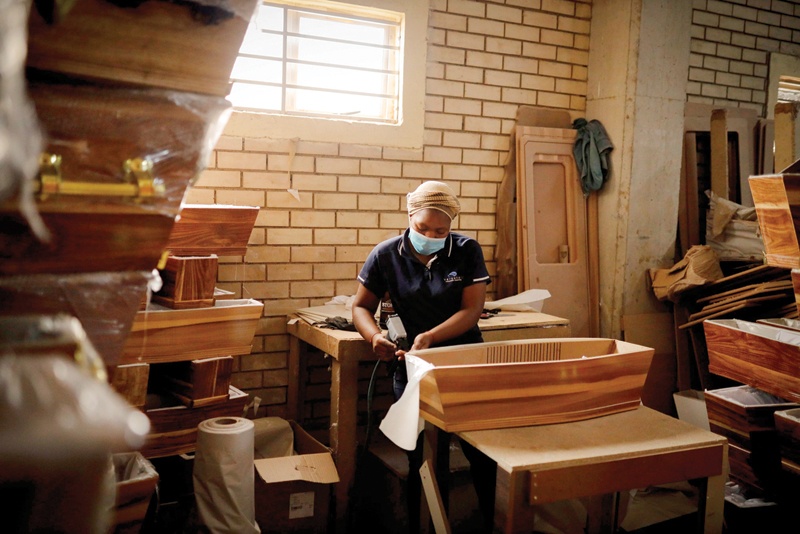 JOHANNESBURG, Gauteng: A worker builds a wood coffin at the Enzo Wood Designs manufacturing facility in Johannesburg, South Africa.-AFP
JOHANNESBURG, Gauteng: A worker builds a wood coffin at the Enzo Wood Designs manufacturing facility in Johannesburg, South Africa.-AFPJOHANNESBURG: The cold hits you first. Then comes the smell. Inside a refrigerated shipping container are 17 plastic-wrapped corpses, each bearing a yellow label reading "highly contagious." The 12-metre (40-foot) steel box has been installed at Johannesburg morgue to help it cope with a rising tide of COVID deaths. The container can store up to 40 corpses, keeping them at a constant zero degrees Celsius (32 degrees Fahrenheit). "We have seen an increase of around 40 percent (in corpses) across the country," said spokesman Marius du Plessis of AVBOB, a leading funeral and burial service provider in the country.
South Africa is the continent's worst-hit country in the pandemic, with more than 1.4 million coronavirus cases and 40,800 deaths. It was already struggling to beat back infections when they surged to unprecedented levels this month after scientists detected a new virus variant widely believed to be more contagious. To help store the influx of bodies-and ensure COVID-19 victims are separated from others-AVBOB has distributed 22 containers normally used for transporting goods to its 250 South African morgues.
Quick turnover
At a funeral home in the administrative capital Pretoria, an undertaker ties a third layer of plastic around a corpse sent that morning from a coronavirus hospital ward. Only the feet, arms and head can be distinguished of the tightly wrapped bundle lying on a stainless steel table, surrounded by white-tiled walls. The body must be buried soon. "COVID bodies can be kept for seven days maximum," facility manager Naomi Van der Heever said. The surrounding refrigerated rooms are almost full, with 200 bodies waiting to be buried or cremated. More than half succumbed to the virus. "They have to go quick, it's protocol," said Van der Heever. "With turnover, we have avoided full capacity."
Coffins in demand
Coffin makers are also feeling the strain. "I can't take any more orders," repeats the secretary of Johannesburg manufacturer Enzo Wood every time she answers the phone. More than 100 workers have been laboring non-stop since the early morning, spraying sawdust across the factory floor. The noise is deafening as machines turn relentlessly for eight hours a day, churning out dozens of wooden planks. It then takes only 20 minutes to assemble a coffin.
Vaccine nationalism
South African President Cyril Ramaphosa yesterday lashed "vaccine nationalism," accusing rich countries of bulk-buying coronavirus vaccines and hoarding them to the detriment of others. Addressing the all-virtual 2021 World Economic Forum (WEF), Ramaphosa said low- and middle-income countries were being shouldered aside by wealthier nations able to acquire "up to four times what their population needs". "We are concerned about vaccine nationalism," he warned.
"Rich countries in the world are holding on to these vaccines and we are saying: release the excess vaccines that you have ordered and hoarded." Ramaphosa's comments coincides with growing concerns that bilateral deals between wealthier governments and coronavirus vaccine manufacturers could hike prices and limit supply in some regions.
The World Health Organization (WHO) had already warned against "vaccine nationalism" and "price gouging" last year, before a successful jab was found. WHO head Tedros Adhanom Ghebreyesus this month told rich countries not to "cut the queue" and called on those which had ordered excess doses to hand them over to its Covax vaccine-sharing facility. - AFP










